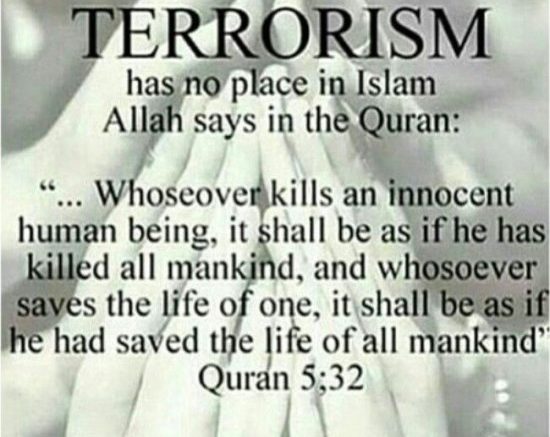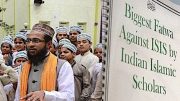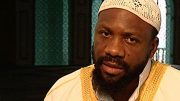This is unjustifiable burden to place on the Beloved Messenger (s) of God. He was sent as a mercy for all humanity. Allah says: “And We sent you merely as a mercy for all humanity.” [Sûrah al-Anbiyâ’: 107]
What else is mercy but “compassionate or kindly forbearance shown toward an offender, an enemy, or other person in one’s power”. This characteristic of mercy is for all humanity i.e. all human beings collectively. It is not a selected few to whom the Prophet’s mandate of mercy extends but rather it is to ALL HUMANITY. In murder where is the mercy? Where is the mercy in vigilantism? Where is the mercy in suicide or roadside bombings? Where is the mercy in making market places, schools and offices into targets?
Despite all of the hostility, sanctions, boycotts and battles waged against Muhammad (s) Arabia fell under his (s) leadership without a single slaughter by him (s), The number of people who were killed during the twenty-three years of his mission were less than two hundred people. The Muslims who were killed during that time by their enemies were many times in excess of that number. Muslims there is only one enemy and that is yourself. The nafs (ego) has nothing good in it.
We need a return to the concept of futuwwa (chivalry). It has been “defined in many ways: not despising the poor or being deceived by the rich and riches; being fair to everybody without expecting fairness from anyone; living one’s life as a pitiless enemy of one’s carnal self; being ever considerate of others and living for them; smashing all idols or all that is idolized, and rebelling against falsehood so as to be wholly devoted to God Almighty; bearing whatever evil is done to oneself but thundering where the rights of God are violated; feeling remorse for the rest of one’s life for committing even a small sin, but overlooking others’ sins regardless of how large they are; seeing oneself as a poor, lowly servant while considering others as saintly; not resenting others while maintaining relations with those who resent you; being kind to those who hurt you; and serving God and the people more than anyone else, but preferring others to oneself when it is time to receive one’s wages.
 Some have summed up futuwwa in the four virtues mentioned by Haydar Karrar ‘Ali (r.a.), the fourth Caliph and cousin of the Prophet (s). They are: forgiving when one is able to punish, preserving mildness and acting mildly and gently when one is furious, wishing one’s enemies well and doing good to them, and being considerate of others’ wellbeing and happiness first, even when one is needy.
Some have summed up futuwwa in the four virtues mentioned by Haydar Karrar ‘Ali (r.a.), the fourth Caliph and cousin of the Prophet (s). They are: forgiving when one is able to punish, preserving mildness and acting mildly and gently when one is furious, wishing one’s enemies well and doing good to them, and being considerate of others’ wellbeing and happiness first, even when one is needy.
‘Ali was one of the greatest representatives of futuwwa. When he was stabbed by Ibn Muljam while leading the morning prayer in the mosque, his children, who saw that their father would die, asked him what he wanted them to do with Ibn Mul-jam. He did not order his execution in retaliation. [1] During a battle, ‘Ali threw his enemy to the ground and then released him. His reason: When ‘Ali was about to kill this man, the latter spat in ‘Ali’s face, which angered him. Fearing that his motive for killing the man was now confused and sullied, ‘Ali released him. [2] He felt sincere grief when Zubayr ibn ‘Awwam, a leading Companion and his staunch enemy, was killed. [3] Since he always considered others first even when he was in need, he usually wore summer clothes in winter and trembled with cold. [4] It was said about him that there cannot be a young, chivalrous man like ‘Ali, and there cannot be a sword like Dhu al-Fiqar (‘Ali’s sword). [5] ‘Ali lived with the Prophet, upon him be peace and blessings, and was raised by him. He lived a perfectly honest, pure life without any taint, and embodied God’s answer to the Prophet Moses, upon him be peace, about futuwwa: It means that you are able to return your self to me as pure or untainted as you took it from Me.“
How are Muslims reacting to indiscriminate use of violence by vigilantes and extremists groups. The reactions can be categorized into two groups: 1. Denying the acts any religious legitimacy, 2. Applauding the acts based on their political worldview
1. Denying the acts any religious legitimacy
If this is the case for a nest of ants, consider how much worse it must be to visit harm upon human beings. The critical question that needs to be answered by this lot is what has the murders at Fort Hood or the bombing of civilian places actually achieved? Suffering, tragedy, tears, and sacrifice of those innocents without any gains on the policy front. May God grant His human creation relief from this period or darkness and bring us to light, ameen.





Be the first to comment on "MURDER IS NOT A TENET OF MY FAITH"